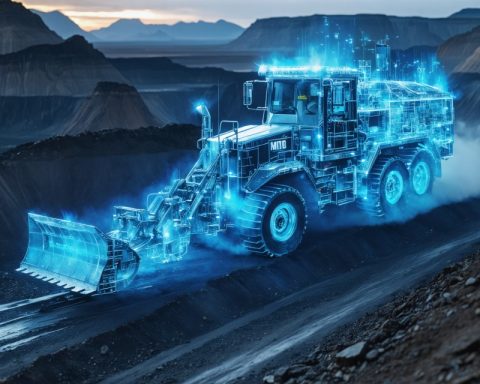- Rivian is emerging as a key player in the EV industry, competing with major brands like Tesla and Ford.
- The company is innovating in battery technology, focusing on higher energy density and quick charging capabilities.
- A partnership with Amazon involves a massive order for 100,000 electric delivery vans by 2030, highlighting Rivian’s role in sustainable logistics.
- Challenges include tech-stock volatility and global supply chain issues that impact its market performance.
- Rivian’s EV lineup features rugged trucks and SUVs using recycled materials and aiming for renewable energy manufacturing.
- Analysts foresee growth driven by consumer demand for eco-friendly vehicles and tech innovations.
- Diversifying supply chains and advancing local manufacturing are strategic goals for overcoming industry obstacles.
The electric vehicle (EV) landscape is transforming at lightning speed, and Rivian is steering its way to the forefront. Emerging as a fierce contender among giants like Tesla and Ford, Rivian is capturing attention with strategic innovations and bold alliances. The company’s remarkable strides in battery technology, emphasizing enhanced energy density and rapid charging, are setting new benchmarks in electric mobility.
Driving Rivian’s journey is its powerhouse partnership with Amazon, which has placed a colossal order for 100,000 electric delivery vans by 2030. This alliance not only injects financial muscle but also affirms Rivian’s strategic edge in the commercial sector. It’s a significant vote of confidence, showcasing Rivian’s pivotal role in redefining logistics and green transport.
Yet, the road is far from smooth. Rivian must navigate the rocky terrain of tech-stock volatility and global supply chain disruptions. These factors cast shadows over its share price, keeping investors on their toes.
Rivian is also making waves with its rugged, adventure-ready electric trucks and SUVs, appealing to both city cruisers and off-road explorers. Their sustainability focus shines through in the use of recycled materials and a progressive march towards renewable energy in manufacturing.
Analysts predict that Rivian will continue this upward trajectory, riding on consumer demand for sustainable solutions and groundbreaking EV technology. Key to its success will be its response to supply chain hurdles through diversification and local manufacturing efforts. As Rivian expands its reach, it stands poised to influence future market directions, carving out a significant slice of the EV pie.
In a rapidly evolving market, Rivian is a symbol of potential and progress, its journey offering a thrilling glimpse into the future of transportation.
Rivian Revolution: How This EV Pioneer is Disrupting the Market
Pros and Cons of Rivian’s Strategic Moves
Pros:
1. Innovative Battery Technology: Rivian’s focus on enhancing energy density and rapid charging is setting new industry standards for EV performance.
2. Strong Partnership with Amazon: The massive order of 100,000 electric delivery vans anchors Rivian’s position in the electric commercial vehicle market, providing both financial stability and brand credibility.
3. Sustainability Commitment: Utilization of recycled materials and strides towards renewable energy in its manufacturing processes highlight Rivian’s role as a leader in sustainable automotive solutions.
Cons:
1. Tech-Stock Volatility: Fluctuations in the tech-stock market pose a risk to Rivian’s share prices, creating uncertainty for potential investors.
2. Supply Chain Disruptions: Global disruptions continue to challenge Rivian’s production and delivery timelines, impacting its ability to meet high demand efficiently.
Key Features of Rivian Vehicles
– Adventure-Ready Design: Rivian vehicles are crafted to suit both urban living and rugged terrains, appealing to a diverse customer base.
– Cutting-Edge Technology: Enhanced DRIV3R-Assist™, Rivian’s advanced autonomous driving system, underscores the company’s emphasis on safety and innovation.
– Eco-Friendly Manufacturing: Rivian employs recycled materials and aims for a fully sustainable production process to reduce environmental impact.
Market Analysis: Rivian’s Position
Rivian is capturing a growing market segment, particularly among environmentally conscious consumers and businesses seeking sustainable logistics solutions. Analysts forecast a strong upward trajectory for Rivian, as the demand for EVs and green transport solutions increases globally. However, overcoming current supply chain issues and expanding local manufacturing capabilities will be crucial for maintaining momentum.
FAQs about Rivian
1. How is Rivian addressing supply chain challenges?
Rivian is diversifying its supplier base and investing in local manufacturing to mitigate global supply chain disruptions. These strategies are aimed at ensuring consistent production and delivery of its vehicles.
2. What makes Rivian’s partnership with Amazon so significant?
Amazon’s colossal order for 100,000 electric delivery vans underscores confidence in Rivian’s capability to produce efficient, reliable commercial vehicles. This partnership not only solidifies financial backing but also enhances Rivian’s reputation in the EV sector.
3. How is Rivian contributing to sustainability in the automotive industry?
Rivian’s commitment to sustainability is evident through its use of renewable energy in production and utilization of recycled materials. These efforts are part of a broader strategy to minimize environmental impact and lead the shift towards more sustainable transportation solutions.
For further information, you might explore Rivian’s main domain for the latest insights and developments.








